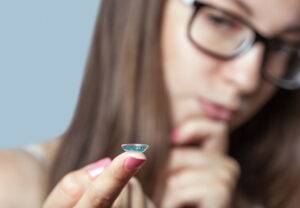If you’re currently wearing glasses and find yourself consistently wondering, “should I get contacts?” it’s probably worth considering the many advantages of today’s contact lenses. Most people love the change from spectacles when they find out that contacts are safe to wear without the risk of surgery, they often offer better vision and more freedom than you could ever hope for with glasses, and unlike contacts just a few years ago, are more comfortable and convenient than ever.
Advantages of Contact Lenses
- Soft contacts comfortably lie over the surface of your eye and conform to its curvature, without the visual distortions that are inherent with eyeglass lenses. Because there are no frames, you will enjoy a wider field of view and will observe objects at their exact size.
- Some contact lenses get made for wearing while you sleep and can reshape your cornea during the night to temporarily correct myopia (orthokeratology, also known as ortho-K or Corneal Refractive Therapy) so that you can see clearly with no need for contacts or glasses during the day.
- Contact lens wearers enjoy the ability to wear non-prescription sunglasses.
- Unlike glasses, contact lenses won’t get in the way of your active lifestyle. You can wear contacts with comfort while playing sports or exercising, and today’s new technology contact lenses are not prone to dislodging or popping out.
- Contact lenses aren’t affected by humidity or sudden temperature changes. They won’t suddenly fog up in cold weather or when you lean forward over a cup of piping hot coffee.
Our list of advantages could go on and on, but hopefully, some of these have already answered the question of “should I get contacts?” for you already!
Be Ready for Your Contact Lens Appointment
When you ask your eye doctor “should I get contacts?” at your comprehensive eye exam, your optometrist will consider eye health and also give you an idea of whether you’ll do best in soft, rigid, hybrid, toric, monovision, scleral, or some other contact lens modality to match your needs best. You’ll have time to ask the optometrist any questions you have while they are taking careful measurements of the front of your eye, and then you’ll have a contact lens “fitting” or prescribing with diagnostic contact lenses.
On the day of your contact lens prescribing visit, consider not wearing makeup, and ensure that your fingernails are clean and smooth. Ragged or long fingernails can scratch your cornea as you try to put your contact lenses in and getting makeup in your eyes while touching them will increase the risk of infection. Contacts are a medical device, and the eye doctor’s staff need to educate you to make sure you know how to use and take care of them to avoid complications. To the services to determine the best contact lenses for you can take several hours, including time to learn how to apply and remove your contacts.

Should I Get Contacts if I Have an Eye Problem?
There are special contact lenses that can work for you even if daily contacts are not an option or if you’ve had trouble wearing them.
Scleral lenses are rigid, gas permeable lenses that cover the entire cornea. They rest on the white part of the eye (the conjunctiva and sclera) and offer a solution for patients with an irregular cornea, corneal scars, or keratoconus. The lenses trap saline against the surface of the cornea while you wear them, so if you suffer from severe dry eye disease, scleral lenses can play a role in keeping your eye surface hydrated.
Specialized oversized scleral lenses rest mostly on the conjunctiva which is not as sensitive as the cornea. In addition to that, their large diameter means that they extend underneath the eyelids and don’t move, making them very stable and causing your eyes to be less aware of the contacts. Scleral lenses are similar to soft disposable contacts for wearing comfort when appropriately prescribed.
If you suffer from eye disfigurement due to trauma or a severe infection, prosthetic contact lenses can improve the appearance of a scarred eye. Sometimes disposable cosmetic contacts will give a satisfactory result, but if the shape of your eye won’t provide on-eye stability for a disposable lens, you might need a prosthetic scleral shell.
With Contacts, Life is Good
The answer to ‘should I get contacts?’ is most likely a resounding yes. Now that you know the benefits of contacts to your lifestyle and the health of your eyes don’t delay booking an appointment with an optometrist to find out which type of contact lenses are best suited to your eyes. Then get ready to celebrate and live life to the fullest with better vision, plus the comfort and convenience contact lenses offer.
